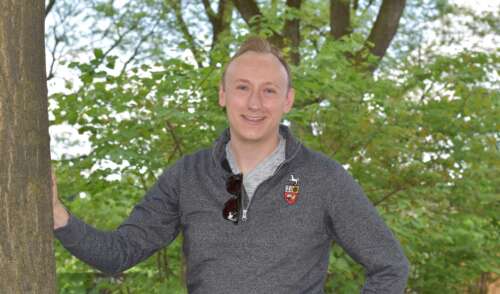When Dr. Adam Davies became involved with new Sexualities, Genders, Bodies and Social Change programs at the University of Guelph, their goal was to provide a space for the queer community in academia and on campus but also to extend queer and trans knowledge beyond those who identify as LGBTQ2SIA+ (lesbian, gay, bisexual, trans, queer, two-spirit, intersex and asexual).
Awareness of the queer community often kicks into high gear during Pride Month, said Davies. However, it’s time to dig a little deeper and recognize how the conversations taking place outside queer and trans communities are not always the same as the ones among LGBTQ2SIA+ folks, they added.
As a queer, non-binary assistant professor in the Department of Family Relations and Applied Nutrition, Davies knows what it’s like to have to keep your identity at the forefront of everything you do because you’re working inside heteronormative and cisnormative structures.
Heteroprofessionalism, femmephobia and other alienating structures
Heteroprofessionalism, a theory developed by Dr. Robert Mizzi, a Canada Research Chair and associate professor at the University of Manitoba, is ultimately about the diminishment of queerness and gives language to “highly corporatized and heteronormative ideas” of what it means to be a professional, Davies explained.
Working in early childhood education, they have encountered stereotypes that bred false notions that queer people are not best suited to care for children, or that queer men and nonbinary people are even predatory and dangerous to children and families.
“These ideas mark me in a way that casts me outside the mold of heteroprofessionalism,” they said. Davies builds on Mizzi’s theory of heteroprofessionalism in their research by deconstructing how normative ideas about what it means to be professional have negative impacts on queer and trans faculty and educators, who experience significant discrimination and erasure in higher education.
“People should always be seeing representation,” Davies said. “Students need to see themselves represented in the faculty that are teaching them and they need to see themselves in the knowledge they’re absorbing as well.”
‘We literally exist in a system not made for us’
By extension, Davies’s work also explores femmephobia, a conversation they are passionate about continuing as the topic is less understood outside queer circles, despite its highly oppressive nature.

Femmephobia, as theorized by Dr. Rhea Ashley Hoskin, a post-doctoral scholar at the University of Waterloo, investigates the ways society regulates and devalues femininity as a construct, or the idea that to be femme, or identify with femininity, is to be inferior in some way. Viewed through a heteronormative lens, being femme can also carry a comedic connotation as though that person’s identity is somehow a joke and therefore unprofessional, Davies said.
“Pay attention to those everyday moments, how we interact with each other and how that gets taken for granted,” they said.
Assuming someone’s gender or sexuality or even presuming that everyone around you has had a similar lived experience is problematic and isolating in wider society and in professional environments. Neglecting to consider your personal biases can manifest in microaggressions, such as misgendering someone or offering unsolicited comments about one’s behaviour or gender expression.
In order to tackle microaggressions at the root, Davies said, they need to be connected to broader socio-cultural structures to understand how forms of exclusion take place, both on university campuses and within larger society. Microaggressions are a form of psychological violence because ultimately, they create a sense of unbelonging, they said.
This is what makes things like Pride Month so important, they said. “We literally exist in a system not made for us.”
Emotional labour is exhausting for marginalized communities
U of G’s new program, launching this fall and available to undergraduate and graduate students, “is a space for engaging in queer, anti-racist thought that was really needed on campus,” Davies said.
What makes the program unique, they pointed out, is the interdisciplinary element. While the mandate is to centre queer and trans voices, having all students engage with queer and trans theories and stories takes some of the emotional labour away from the LGBTQ2SIA+ community and creates an opportunity for straight and cisgender people to do some of that work, Davies explained. It requires reflecting upon their own experiences of gender and sexuality, to consider their own biases and to unpack their privilege, to carefully and respectfully learn about LGBTQ2SIA+ lives and theories.
That aspect is so important, Davies said, because constantly challenging structures is an exhausting load for queer people to carry in addition to their day-to-day work. For some, it can give way to shame or paranoia that they will be considered aggressive or pushing a personal agenda, making allyship all the more important.
Being queer means creating space for visibility, change
Within institutions, Davies says, training people on these issues and allowing genuine space for marginalized voices to be heard and valued can greatly improve the campus or workplace climate.
U of G’s new program is one way to begin by requiring students to ask critical questions and take their insights and reflections back to other departments to make effective changes. “Knowledge is imbued with power dynamics. What we teach students reproduces certain ideas,” Davies said, suggesting that people reconsider traditional methods like basing research questions on the gender binary.
“Part of being queer is also creating space for queer generations in the future,” they said. “If I can carve out space for a safer university or a safer world for queer people who are going to come after me, that’s really important for me.
“In that sense, my work isn’t just about me or isn’t just about what’s going on right now. It’s about actually doing something so that other people do not have to experience what I’ve experienced, in both higher education and society widely.”
Contact:
Dr. Adam Davies
adam.davies@uoguelph.ca
